FarmBioNet workshop brings farmers together to share biodiversity knowledge
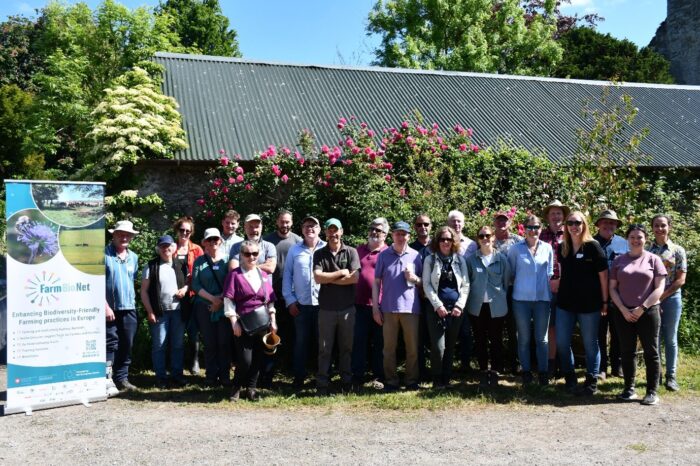
FarmBioNet aims to help farmers assess biodiversity on their farms and implement low-cost, practical actions to enhance biodiversity without negatively impacting production.
Claudia Barry, Biodiversity Research Technician, Niall Walshe, FarmBioNet Research Officer, Meritxell Grau, FarmBioNet Project Manager, and Saorla Kavanagh, FarmBioNet Project Coordinator & Research Officer, tell us more about its first workshop which share biodiversity knowledge among 30 National Network (NN) members.
The Farmer-Focused Biodiversity and Agricultural Knowledge Network (FarmBioNet) Project celebrated the International Day for Biological Diversity on May 22nd, 2025, by holding the first on-farm knowledge exchange visit and workshop.
Thirty National Network (NN) members, representing every farm enterprise, participated on the day including 18 farmers, 3 foresters, researchers, non-governmental organisations (NGOs), advisors, industry partners, policymakers and other relevant Agricultural Knowledge and Innovation Systems (AKIS) actors. Every farm enterprise was represented.
Both the knowledge exchange visit and workshop took place on the McCall’s Farm in Calverstown, Co. Kildare. This historical farm, dating back to 1290, is managed holistically, fostering interactions between plants, soils and animals within a productive farming and forestry enterprise. The McCalls have been farming organically since 2023 and have contributed to several leading environmental projects including: Protecting Farmland Pollinators, The Farmer Moth Monitoring EIP, and RestPoll.
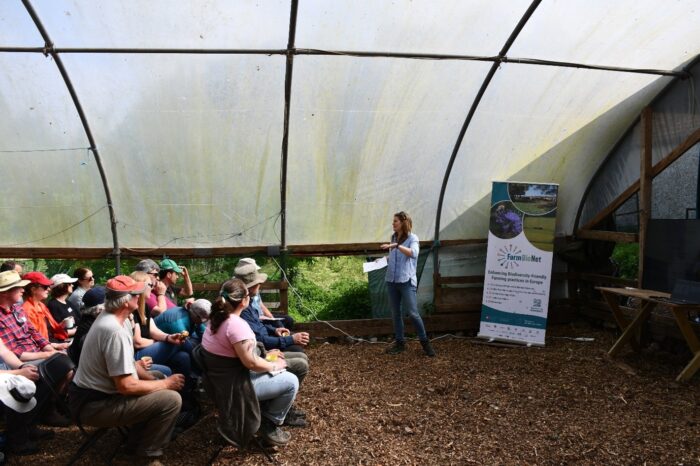
FarmBioNet Project Coordinator, Dr. Saorla Kavanagh welcomes National Network members to the McCall’s farm
Biodiversity-friendly farming practices
The day began with a warm welcome from Teagasc coordinator Dr. Saorla Kavanagh, who introduced the NN members to the McCalls and their farm as well as the aims for the day. The presentation was followed by an engaging workshop where participants discussed 58 different biodiversity-friendly farming (BFF) practices. Each practice was evaluated by participants for its impact on biodiversity and its economic viability for farmers. These discussions and evaluations are a key part of FarmBioNet’s efforts to collect valuable data on BFF practices and their dual benefits to nature and the farm economy.
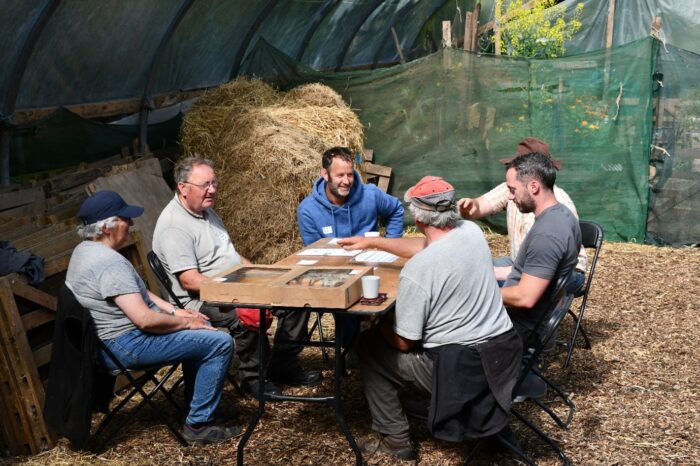
The second half of the day featured a guided farm walk, led by Kim McCall, highlighting 13 of the many BFF practices implemented across the farm. Among the standout features were a series of ponds, ranging in age from 2 to 39 years old, which now provide habitat for a rich diversity of dragonflies, damselflies, and a host of other animal and plant species. Soil excavated during pond creation was used to build a south facing bank, offering essential nesting sites for pollinators including solitary mining bees and wasps.
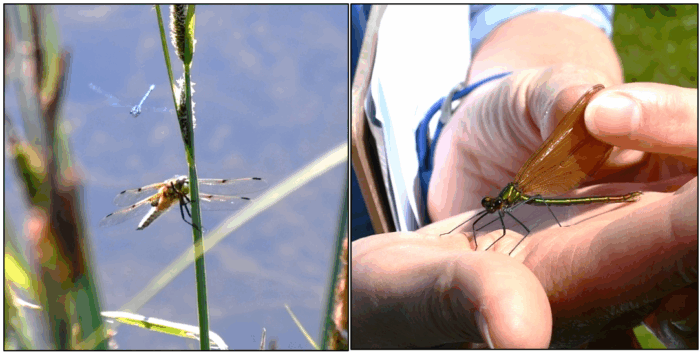
Four-spotted chaser dragonfly with blue damselfly with pond in the background (left), beautiful demoiselle (right).
The McCalls have planted over 60,000 trees on their land. They have divided larger fields with newly planted hedgerows, with an average of 15 species per hedgerow. These hedgerows serve multiple purposes: providing food and shelter for livestock and wildlife, acting as wildlife corridors, and supporting habitat connectivity across the landscape.
Grasslands on the farm are also carefully managed for biodiversity. A notable highlight is a 12-acre species-rich meadow, which is allowed to flower and reseed naturally through the year before being strip-grazed by cattle in the autumn. This practice supports a large diversity of insects including butterflies, bumblebees, solitary bees, hoverflies, shieldbugs, spiders and moths as well as large floral diversity including yellow-rattle, red clover, bird’s-foot-trefoil and orchids. The meadow is now part of the ‘Great Irish Grassland Trail’.
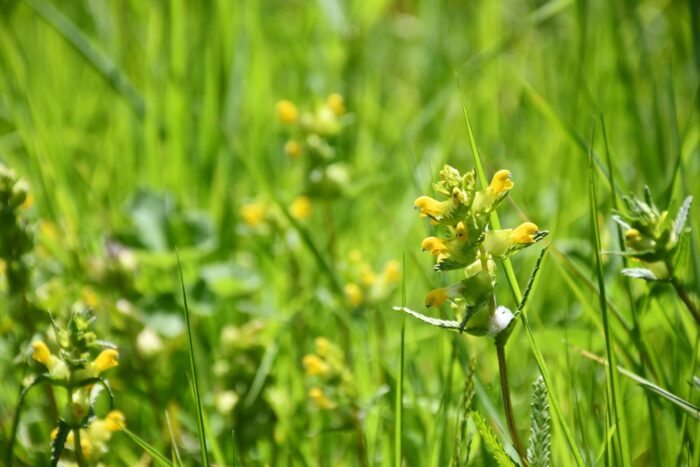
Yellow rattles growing in species-rich meadow
The event proved to be a valuable and engaging experience, with overwhelmingly positive feedback form participants. Attendees valued the opportunity to contribute to research at a European level and were encouraged to know that their insights and experiences would inform the project’s outputs. The workshop sparked rich, open discussions around BFF practices, with individuals keen to share how they have implemented these measures on their own farms. The farm walk was particularly valued, offering a chance to see firsthand how the McCalls integrate BFF practices on their farm. Many highlighted the importance of balancing biodiversity efforts with farm economics and time commitments and were encouraged to know that these important considerations could be taken into account at both national and European levels when shaping future agri-environmental strategies.
The aims of FarmBioNet
FarmBioNet aims to help farmers assess biodiversity on their farms and implement low-cost, practical actions to enhance biodiversity without negatively impacting production. The project will use a multi-actor approach to determine best practices.
Learn more about FarmBioNet and sign up to the biannual newsletter.
You can find out more about helping pollinators on your farm here.
